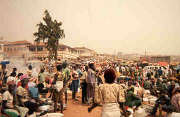Off to Kumasi
From Cape Coast it took us 3½ hours to get to Kumasi, Ghana’s second largest city. Kumasi is different from Accra is many respects – first of all it lies in a green belt, meaning that there are more trees, more flowers and a milder climate than the coastal region. Second, it is the capital of the Ashanti people, Ghana’s largest ethnic group, who have a long history as powerful players in local politics.

Sprawled across about 2km of the Kumasi centre lies the dusty market. Enthroned as the largest market of the land, it has thousands of vendors selling everything under the sun – fruits, vegetables, soap, new clothes, used clothes, shoes, furniture, cloth, hardware, household items, kitchen items, religious books. They are being sold in stalls, on tables, spread on newspapers along the ground or in large baskets balanced on the heads of wandering vendors.
On the outskirts of the market vendors line up along the main arterial roads or spill out into the streets. Buyers and vendors with their goods laden on their heads – stacked high in large metal bowls, jostle onlookers for the remaining sidewalk space. People climb around the dusty parked cars, and the ones stopped in traffic – crumbling Peugeots, ancient minivans filled to the brim, their passengers leaning out, haggling, yelling.

The centre of the market was dense with winding, narrow alleys of stalls and tables. To get around we climbed up stairs, over drains, ditches and sewers, walking behind people, around people, always endless people. Sadly it seemed as if everyone was selling, hardly anyone buying; the man walking behind us with a bowl of sponges on his head, the women in front of us with a platter of coconuts, the stalls on the left selling washing detergent, the one on the right some colourful cloth. Everyone was smiling at us, wanting our business, wanting our money in order to break even at the end of the day.
And it was dusty. The dust swirling around, obliterating the sun, the sky, and anything more than 25 meters away into a musty haze. And the hot, searing sun was beating down as we picked our way through the market chaos on (what we heard) is a typical Kumasi afternoon.
We went back to relax on the veranda at the Presbyterian guesthouse where we were staying. It is a ramshackle colonial building with gigantic shaded verandas and lots of character. The rooms have high ceilings, passable beds and creaking ceiling fans. We decided to put our mosquito nets up, as the place was buzzing with them. Lots of interesting people were staying at the Presbyterian that night. Church members, business men from Burkina Faso, three Canadians, a few Germans and a Dutch couple. In the evening, we met up at the picnic table on the veranda right outside our door, played cards and compared travel stories. A mellow evening, after a tiring day of sightseeing.
A Fifties Style Palace
The Ashanti leader is a king, and he lives at Manhiya palace in Kumasi. It is not possible to visit the current king’s palace, but it is possible to visit that of the former king, which is on the same premises. The palace is not what you expect one to be. Grand it is, for Ghana that is – a large, two storey colonial home, decked out in fifties style furniture.
We went in and took a tour, which started with a 10 minute video presentation on the role of the Ashanti King. The knowledgeable tour guide then took us through the house, and explained the significance of each piece of furniture and each picture. The rooms were done in browns and beige and all were slightly dusty. We found the furniture was more interesting as examples of fifties fashion, rather than as an example of palatial grandeur. We looked at some wax replicas of the king sitting on his favourite chair, and stared at some ‘state’ presents. Everything seemed a tad shoddy, but we felt bad admitting it. The guide, however, was excellent, and really delved deep into the history of the Ashanti King. We left feeling enlightened, but skipped the gift shop on the way out. None of us felt the need for Ashanti key rings or T-shirts, at least not that day.